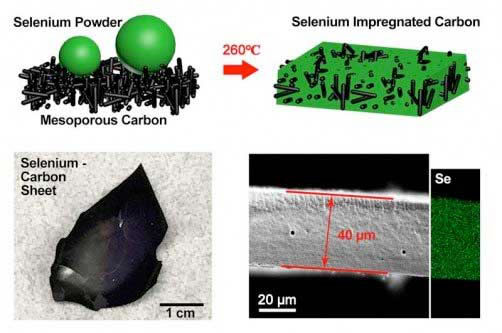Electric cars and other mobile devices can use fast-charging batteries to store large amounts of energy in a small space. According to foreign media reports, the Clarkson University team designed electrodes for such batteries. They use new synthetic technology to produce electrode sheets made of nano-selenium-carbon composite materials. The new positive electrode has the necessary electrical and mechanical properties of rechargeable batteries. This is a new example of high energy density battery design, using selenium impregnated monolithic carbon as an independent positive electrode for high volume energy lithium and sodium metal batteries. The new electrode brings three major advantages to the battery design. It stores a lot of energy in a small space, the battery is durable, and it charges quickly. These are important factors for mobile battery applications such as electric vehicles. At present, the scientific literature focuses on the specific energy of batteries (energy per unit weight). However, for automobiles and other mobile applications, energy density (energy per unit volume) is the first factor that should be considered. This study proposes a new battery material design method to solve this key factor that is not fully understood, and fundamentally deviates from the existing advanced technology. Compared with the manufacture of traditional nanostructured porous electrodes with high specific surface area, this work takes the opposite approach to create dense and non-porous monolithic electrode sheets. The sheet is mechanically self-supporting and may not require a positive electrode current collector at all, further reducing the battery volume. In automotive and power grid applications, selenium metal batteries are becoming a high-energy alternative to traditional ion batteries. Calculated by volume, the energy of the new battery's positive electrode (a dense structure composed of selenium and carbon) is twice that of the porous selenium material. Since the selenium-carbon electrode maintains a nanostructure inside, its charging speed and battery cycleability (the number of times of charging before electrode damage) are excellent. The volume density of the selenium-carbon electrode is relatively high, 2.37g / cc, and the theoretical charge capacity (volume capacity) reaches 1121mah / cc. For lithium (Li) storage, the positive electrode provides a reversible capacity of 1028mah / cc, maintaining 82% of capacity after 300 charge and discharge cycles. The volumetric energy density of the new electrode is unparalleled. Li-Se is 1,727Wh / L (commercial lithium-ion battery is 770Wh / L), and Na-Se is 980Wh / L. The total combined volume of the two is equivalent. At different charging rates, with the increase of current density, they can maintain more than 60% of capacity, making them ideal for high-power battery systems and automotive fast charging applications. Auxiliary systems under [SEALMANN" trademark, mainly used in series of solutions for API Seal Support Systems,Rotor Clip,Advanced Materials,Mechanical Sealing Support Systems Ningbo FLK Technology Co., Ltd. , https://www.flk-global.com
(Source: Clarkson University)
682 standard (PLAN21, 31, 52, 53A, 53B and 53C etc..), with products of reservoir, hydraulic
cyclone separator, heat exchanger etc. Different kinds of gauges and switches can be equipped for
monitor or alarm as required.
Our goal is to provide customers with more reliable product solutions to ensure that the
mechanical seals are running under a safe, stable, long-term reliable environment.
Clarkson University's new electrode increases battery capacity and allows quick charging